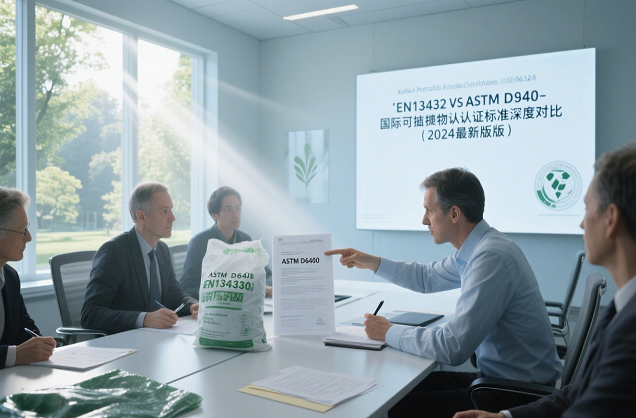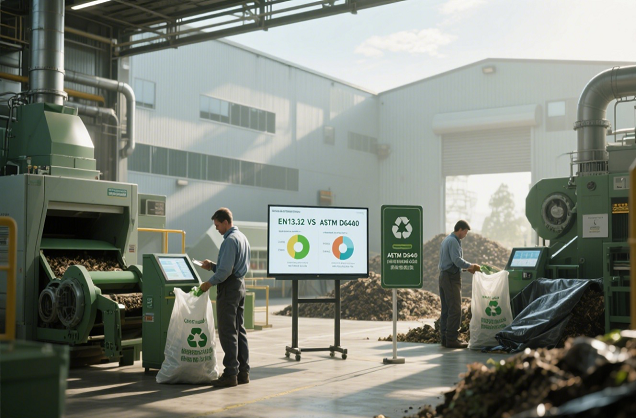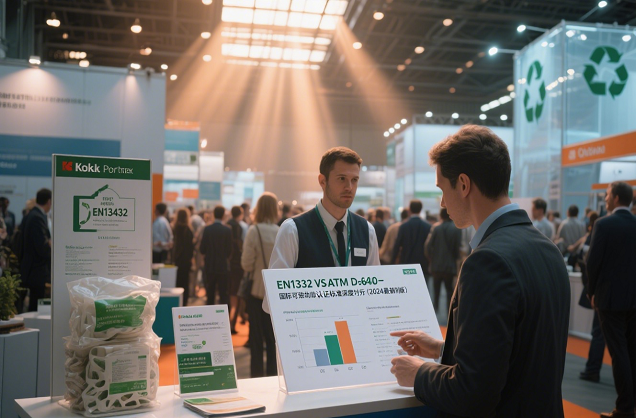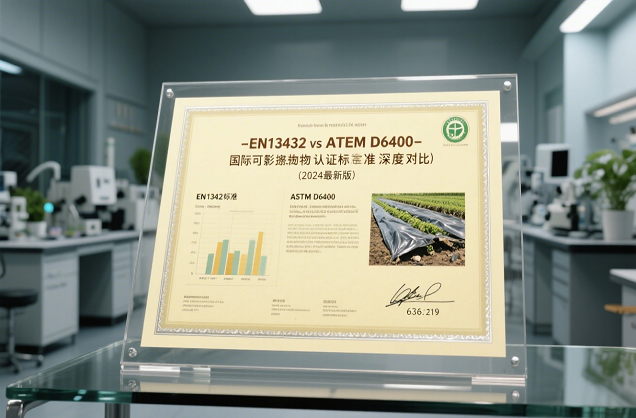EN13432 vs ASTM D6400: In-depth Comparison of International Compostable Certification Standards (2024 Update)
Why are certification standards so important?
The global compostable plastics market is expected to reach $8.2 billion by 2024, but it's alarming that more than 35% of products labeled as “compostable” have not passed the certification test.EN13432 and ASTM D6400 are two of the world's core certification systems, directly affecting the ability of products to enter the European Union and North American markets.

I. Standard background and legal effect
1. EN13432: Passport to the EU market
- Issuing body: European Committee for Standardization (CEN)
- Legal status: mandatory implementation of the EU Packaging Directive 94/62/EC.
- Applicable regions: EU, UK, Switzerland, etc.
- Latest version: 2023 revision (new microplastic detection requirements)
2. ASTM D6400: Technical Bible for the Americas market
- Published by: American Society for Testing and Materials
- Legal Status: Recognized by the U.S. Federal Trade Commission (FTC) as the basis for certification.
- Region of application: United States, Canada, Mexico, etc.
- (Latest update: Seawater degradation test option added in 2022)
3. Global Recognition Comparison
| Certification Systems | Global Acceptance | Major Compulsory Regions | Adoption in China
|----------|------------|--------------|--------------|
| EN13432 | 85 countries | EU | Some leading companies | ASTM D6400 | ASTM D6400 | ASTM D6400 | ASTM D6500
| ASTM D6400 | 72 countries | North America | Requirements for exporters |

II. Detailed comparison of technical indicators
1. Biodegradation rate requirement
| Test conditions | EN13432 standard | ASTM D6400 standard |
|----------------|-------------------|-------------------|
| Timeframe | 6 months | 12 months |
| Minimum Degradation Rate | 90% | 90% |
| Test Methods | ISO 14855 | ASTM D5338 |
| Allowable Tolerance Range | ±5% | ±10% |
Note: EN13432 has additional requirements for degradation rate in the first 2 months.
2. Ecotoxicity test
- EN13432:
- Plant growth test (OECD 208)
- Earthworm acute toxicity test (ISO 11268)
- Latest addition of microplastic test (particle size >100nm)
- ASTM D6400:
- Seed germination test (≥90%)
- Daphnia Acute Toxicity (EC50>100mg/L)
- Optional heavy metal detection (EPA 6010)
3. disintegration requirements
| Parameters | EN13432 | ASTM D6400 |
|----------------|------------------|------------------|
| Maximum Residue Size | ≤2mm | No specific requirement |
| Maximum Residue Size ≤2mm | No specific requirement | Test Cycle | 12 weeks | “Fully disintegrated” required | Sieve Size | 2.5mm | 2.5mm
| Sieve size | 2x2mm square hole sieve | not specified

III. Certification process and cost analysis
EN13432 certification steps
1. Material pre-qualification (2-4 weeks): composition analysis, banned substance screening
2. Laboratory testing (6-8 months): Including:
- Biodegradation test (€15,000-20,000)
- Ecotoxicity testing (€8,000-12,000)
3. Documentation review (1-2 months): conducted by Notified Body
4. Certificate issuance: valid for 5 years
ASTM D6400 Certification Process
1. Initial Evaluation (1-2 weeks): Material Safety Data Sheet Review
2. Accelerated Testing (4-6 months)
- Aerobic Composting Test ($12,000-18,000)
- Soil degradation optional (+$5,000)
3. Third party audits: e.g. BPI certification (2-3 months)
4. Logo License: from $3,500 annual fee

IV. Recommendations for Enterprise Certification
1. Certification path selection
- Attack on the European market: priority EN13432 (France and other state-subsidized)
- America and Asia exports: ASTM D6400 + local standards (such as China GB/T)
- Global layout: dual certification (can save 20% of the duplication of testing fees)
2. Avoidance of common failure points
EN13432 high frequency problems:
- Excessive heavy metals (especially cadmium, lead)
- Failed disintegration test (too much filler)
- Degradation rate not up to standard (<30% in the first 2 months)
ASTM D6400 Typical Rejection Reasons:
- Positive ecotoxicity (additive migration)
- 12 month degradation rate in the 85-89% range
- Unhomogeneous material (affects test reproducibility)
 For PLA/PBAT biodegradable mat
For PLA/PBAT biodegradable mat
 Price war! PBAT raw material p
Price war! PBAT raw material p
 PBAT degradation speed increas
PBAT degradation speed increas
 From Policy to Practice: Impli
From Policy to Practice: Impli
CONTACT
Add: Room 4006, No.1 Helong Yiheng Road, Baiyun District, Guangzhou City
Tel: +8613450255948
Wechat : +86-13450255948
Fax: +86-13450255948
E-mail: 13450255948@163.com








